S00289737 HLSC220: Argumentative Essay, Prenatal Substance Abuse
VerifiedAdded on 2021/08/30
|8
|2068
|61
Essay
AI Summary
This argumentative essay, submitted by a student, explores the contentious issue of mandatory reporting for expectant mothers who misuse alcohol and/or illicit drugs. The essay argues in favor of mandatory reporting, emphasizing the potential risks these substances pose to the fetus, including birth defects, developmental issues, and long-term health challenges. It supports this stance by referencing medical principles, ethical theories (such as beneficence, non-maleficence, and justice), and legal frameworks like the Nursing and Midwifery Board of Australia's code of conduct. The essay acknowledges the potential drawbacks, such as the impact on maternal autonomy and the risk of stigmatization, but ultimately concludes that the benefits of protecting the unborn child outweigh these concerns. The essay also explores the ethical considerations of utilitarianism, weighing the consequences of reporting versus not reporting. References include a range of academic sources that support the arguments presented.
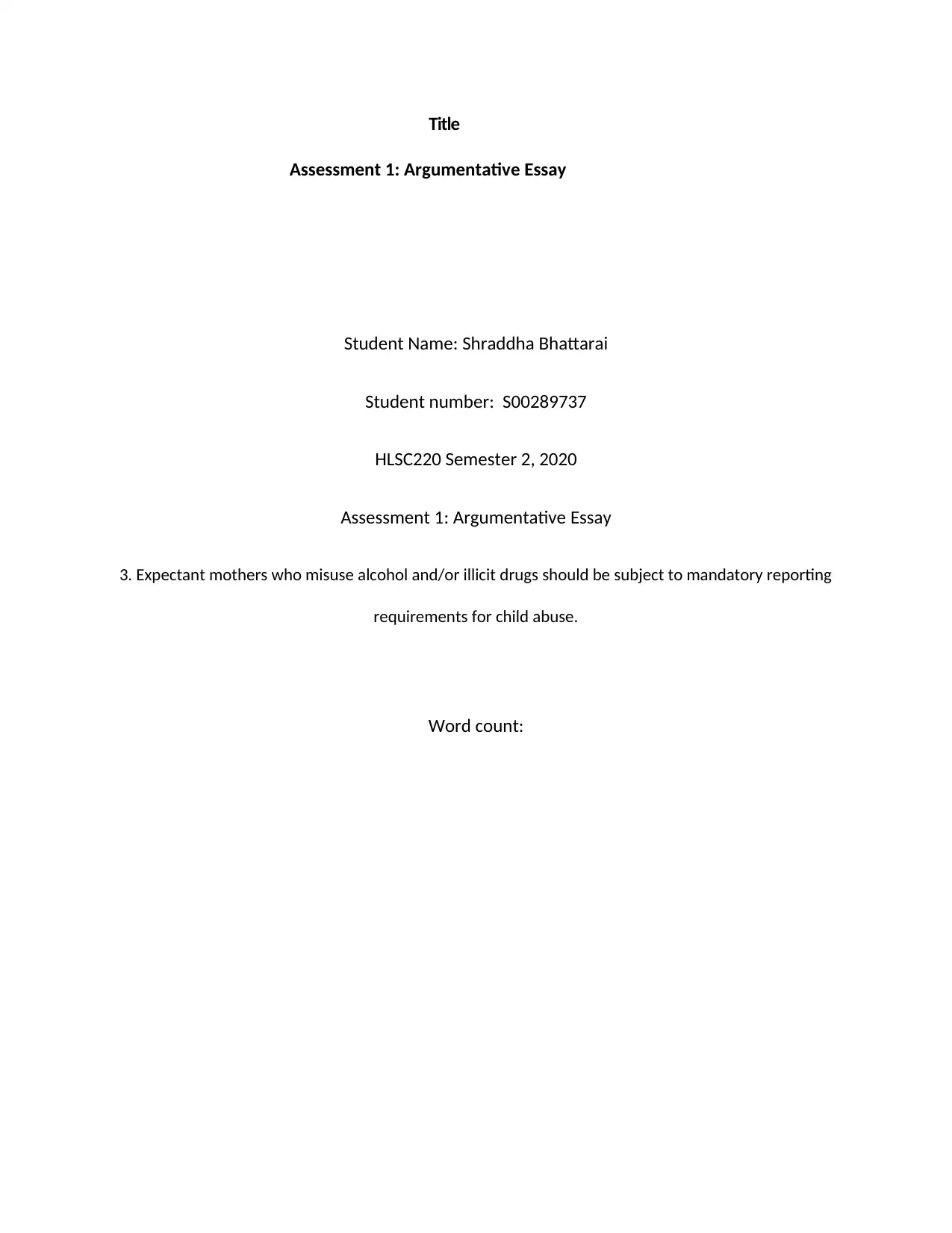
Title
Assessment 1: Argumentative Essay
Student Name: Shraddha Bhattarai
Student number: S00289737
HLSC220 Semester 2, 2020
Assessment 1: Argumentative Essay
3. Expectant mothers who misuse alcohol and/or illicit drugs should be subject to mandatory reporting
requirements for child abuse.
Word count:
Assessment 1: Argumentative Essay
Student Name: Shraddha Bhattarai
Student number: S00289737
HLSC220 Semester 2, 2020
Assessment 1: Argumentative Essay
3. Expectant mothers who misuse alcohol and/or illicit drugs should be subject to mandatory reporting
requirements for child abuse.
Word count:
Paraphrase This Document
Need a fresh take? Get an instant paraphrase of this document with our AI Paraphraser
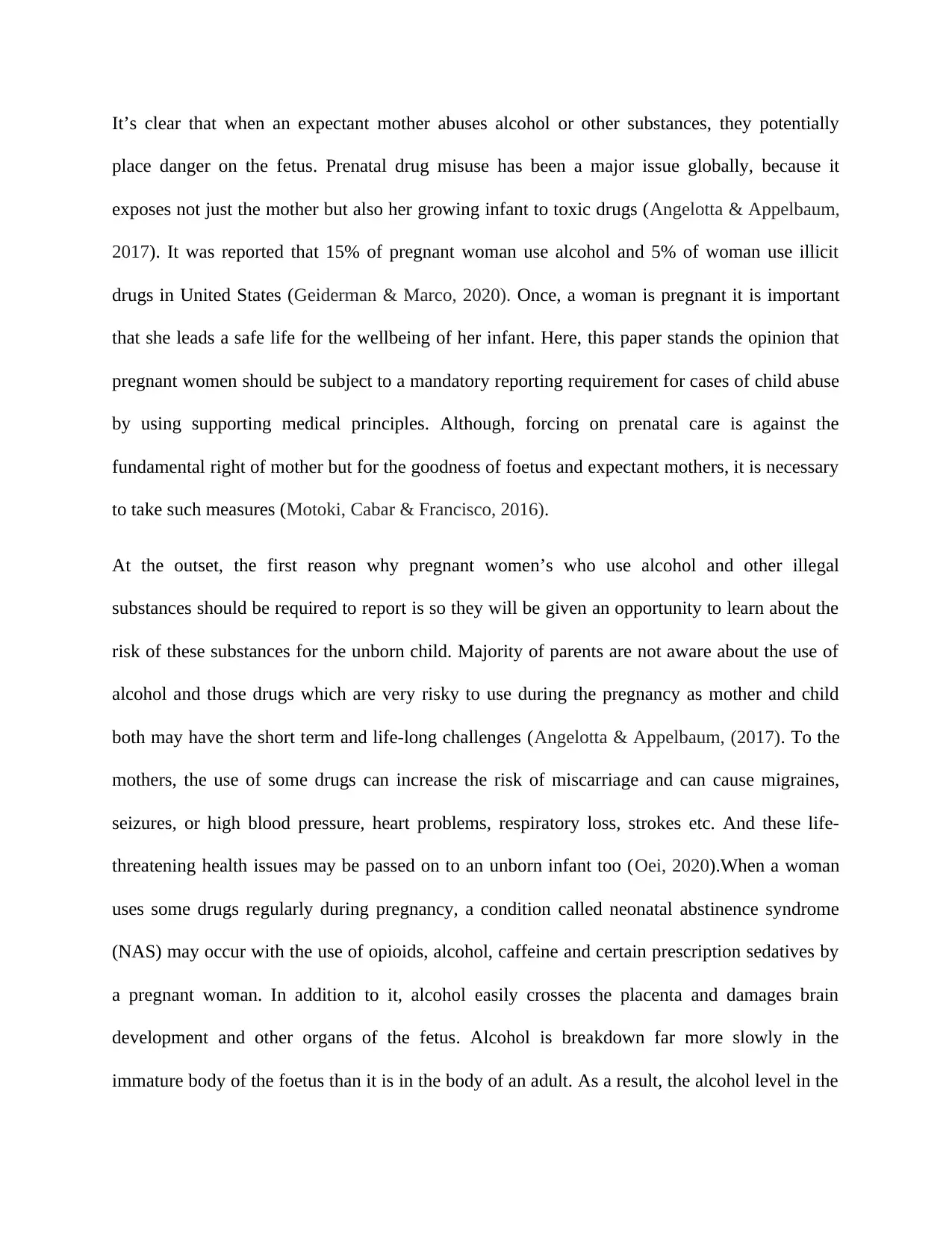
It’s clear that when an expectant mother abuses alcohol or other substances, they potentially
place danger on the fetus. Prenatal drug misuse has been a major issue globally, because it
exposes not just the mother but also her growing infant to toxic drugs (Angelotta & Appelbaum,
2017). It was reported that 15% of pregnant woman use alcohol and 5% of woman use illicit
drugs in United States (Geiderman & Marco, 2020). Once, a woman is pregnant it is important
that she leads a safe life for the wellbeing of her infant. Here, this paper stands the opinion that
pregnant women should be subject to a mandatory reporting requirement for cases of child abuse
by using supporting medical principles. Although, forcing on prenatal care is against the
fundamental right of mother but for the goodness of foetus and expectant mothers, it is necessary
to take such measures (Motoki, Cabar & Francisco, 2016).
At the outset, the first reason why pregnant women’s who use alcohol and other illegal
substances should be required to report is so they will be given an opportunity to learn about the
risk of these substances for the unborn child. Majority of parents are not aware about the use of
alcohol and those drugs which are very risky to use during the pregnancy as mother and child
both may have the short term and life-long challenges (Angelotta & Appelbaum, (2017). To the
mothers, the use of some drugs can increase the risk of miscarriage and can cause migraines,
seizures, or high blood pressure, heart problems, respiratory loss, strokes etc. And these life-
threatening health issues may be passed on to an unborn infant too (Oei, 2020).When a woman
uses some drugs regularly during pregnancy, a condition called neonatal abstinence syndrome
(NAS) may occur with the use of opioids, alcohol, caffeine and certain prescription sedatives by
a pregnant woman. In addition to it, alcohol easily crosses the placenta and damages brain
development and other organs of the fetus. Alcohol is breakdown far more slowly in the
immature body of the foetus than it is in the body of an adult. As a result, the alcohol level in the
place danger on the fetus. Prenatal drug misuse has been a major issue globally, because it
exposes not just the mother but also her growing infant to toxic drugs (Angelotta & Appelbaum,
2017). It was reported that 15% of pregnant woman use alcohol and 5% of woman use illicit
drugs in United States (Geiderman & Marco, 2020). Once, a woman is pregnant it is important
that she leads a safe life for the wellbeing of her infant. Here, this paper stands the opinion that
pregnant women should be subject to a mandatory reporting requirement for cases of child abuse
by using supporting medical principles. Although, forcing on prenatal care is against the
fundamental right of mother but for the goodness of foetus and expectant mothers, it is necessary
to take such measures (Motoki, Cabar & Francisco, 2016).
At the outset, the first reason why pregnant women’s who use alcohol and other illegal
substances should be required to report is so they will be given an opportunity to learn about the
risk of these substances for the unborn child. Majority of parents are not aware about the use of
alcohol and those drugs which are very risky to use during the pregnancy as mother and child
both may have the short term and life-long challenges (Angelotta & Appelbaum, (2017). To the
mothers, the use of some drugs can increase the risk of miscarriage and can cause migraines,
seizures, or high blood pressure, heart problems, respiratory loss, strokes etc. And these life-
threatening health issues may be passed on to an unborn infant too (Oei, 2020).When a woman
uses some drugs regularly during pregnancy, a condition called neonatal abstinence syndrome
(NAS) may occur with the use of opioids, alcohol, caffeine and certain prescription sedatives by
a pregnant woman. In addition to it, alcohol easily crosses the placenta and damages brain
development and other organs of the fetus. Alcohol is breakdown far more slowly in the
immature body of the foetus than it is in the body of an adult. As a result, the alcohol level in the
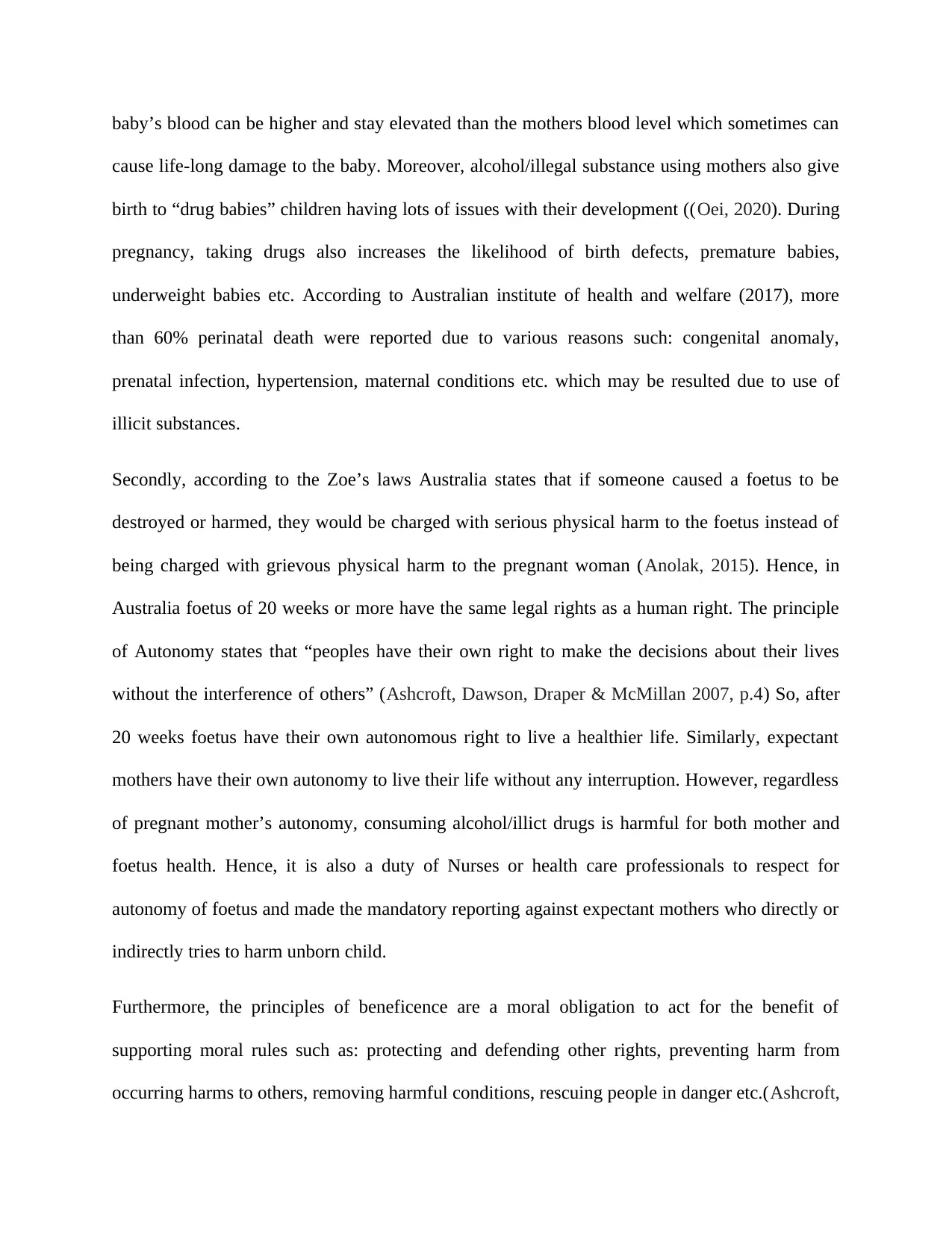
baby’s blood can be higher and stay elevated than the mothers blood level which sometimes can
cause life-long damage to the baby. Moreover, alcohol/illegal substance using mothers also give
birth to “drug babies” children having lots of issues with their development ((Oei, 2020). During
pregnancy, taking drugs also increases the likelihood of birth defects, premature babies,
underweight babies etc. According to Australian institute of health and welfare (2017), more
than 60% perinatal death were reported due to various reasons such: congenital anomaly,
prenatal infection, hypertension, maternal conditions etc. which may be resulted due to use of
illicit substances.
Secondly, according to the Zoe’s laws Australia states that if someone caused a foetus to be
destroyed or harmed, they would be charged with serious physical harm to the foetus instead of
being charged with grievous physical harm to the pregnant woman (Anolak, 2015). Hence, in
Australia foetus of 20 weeks or more have the same legal rights as a human right. The principle
of Autonomy states that “peoples have their own right to make the decisions about their lives
without the interference of others” (Ashcroft, Dawson, Draper & McMillan 2007, p.4) So, after
20 weeks foetus have their own autonomous right to live a healthier life. Similarly, expectant
mothers have their own autonomy to live their life without any interruption. However, regardless
of pregnant mother’s autonomy, consuming alcohol/illict drugs is harmful for both mother and
foetus health. Hence, it is also a duty of Nurses or health care professionals to respect for
autonomy of foetus and made the mandatory reporting against expectant mothers who directly or
indirectly tries to harm unborn child.
Furthermore, the principles of beneficence are a moral obligation to act for the benefit of
supporting moral rules such as: protecting and defending other rights, preventing harm from
occurring harms to others, removing harmful conditions, rescuing people in danger etc.(Ashcroft,
cause life-long damage to the baby. Moreover, alcohol/illegal substance using mothers also give
birth to “drug babies” children having lots of issues with their development ((Oei, 2020). During
pregnancy, taking drugs also increases the likelihood of birth defects, premature babies,
underweight babies etc. According to Australian institute of health and welfare (2017), more
than 60% perinatal death were reported due to various reasons such: congenital anomaly,
prenatal infection, hypertension, maternal conditions etc. which may be resulted due to use of
illicit substances.
Secondly, according to the Zoe’s laws Australia states that if someone caused a foetus to be
destroyed or harmed, they would be charged with serious physical harm to the foetus instead of
being charged with grievous physical harm to the pregnant woman (Anolak, 2015). Hence, in
Australia foetus of 20 weeks or more have the same legal rights as a human right. The principle
of Autonomy states that “peoples have their own right to make the decisions about their lives
without the interference of others” (Ashcroft, Dawson, Draper & McMillan 2007, p.4) So, after
20 weeks foetus have their own autonomous right to live a healthier life. Similarly, expectant
mothers have their own autonomy to live their life without any interruption. However, regardless
of pregnant mother’s autonomy, consuming alcohol/illict drugs is harmful for both mother and
foetus health. Hence, it is also a duty of Nurses or health care professionals to respect for
autonomy of foetus and made the mandatory reporting against expectant mothers who directly or
indirectly tries to harm unborn child.
Furthermore, the principles of beneficence are a moral obligation to act for the benefit of
supporting moral rules such as: protecting and defending other rights, preventing harm from
occurring harms to others, removing harmful conditions, rescuing people in danger etc.(Ashcroft,
⊘ This is a preview!⊘
Do you want full access?
Subscribe today to unlock all pages.

Trusted by 1+ million students worldwide
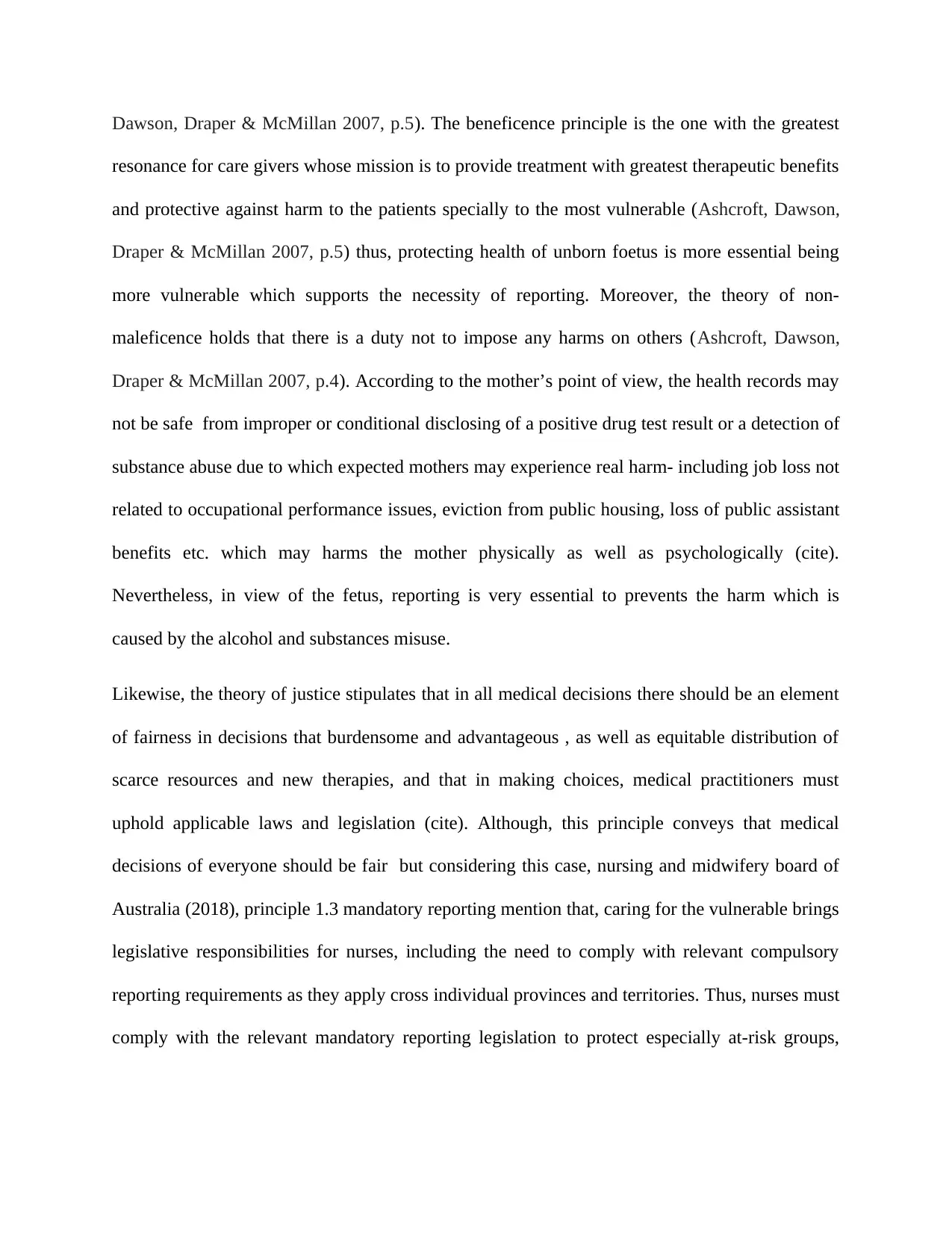
Dawson, Draper & McMillan 2007, p.5). The beneficence principle is the one with the greatest
resonance for care givers whose mission is to provide treatment with greatest therapeutic benefits
and protective against harm to the patients specially to the most vulnerable (Ashcroft, Dawson,
Draper & McMillan 2007, p.5) thus, protecting health of unborn foetus is more essential being
more vulnerable which supports the necessity of reporting. Moreover, the theory of non-
maleficence holds that there is a duty not to impose any harms on others (Ashcroft, Dawson,
Draper & McMillan 2007, p.4). According to the mother’s point of view, the health records may
not be safe from improper or conditional disclosing of a positive drug test result or a detection of
substance abuse due to which expected mothers may experience real harm- including job loss not
related to occupational performance issues, eviction from public housing, loss of public assistant
benefits etc. which may harms the mother physically as well as psychologically (cite).
Nevertheless, in view of the fetus, reporting is very essential to prevents the harm which is
caused by the alcohol and substances misuse.
Likewise, the theory of justice stipulates that in all medical decisions there should be an element
of fairness in decisions that burdensome and advantageous , as well as equitable distribution of
scarce resources and new therapies, and that in making choices, medical practitioners must
uphold applicable laws and legislation (cite). Although, this principle conveys that medical
decisions of everyone should be fair but considering this case, nursing and midwifery board of
Australia (2018), principle 1.3 mandatory reporting mention that, caring for the vulnerable brings
legislative responsibilities for nurses, including the need to comply with relevant compulsory
reporting requirements as they apply cross individual provinces and territories. Thus, nurses must
comply with the relevant mandatory reporting legislation to protect especially at-risk groups,
resonance for care givers whose mission is to provide treatment with greatest therapeutic benefits
and protective against harm to the patients specially to the most vulnerable (Ashcroft, Dawson,
Draper & McMillan 2007, p.5) thus, protecting health of unborn foetus is more essential being
more vulnerable which supports the necessity of reporting. Moreover, the theory of non-
maleficence holds that there is a duty not to impose any harms on others (Ashcroft, Dawson,
Draper & McMillan 2007, p.4). According to the mother’s point of view, the health records may
not be safe from improper or conditional disclosing of a positive drug test result or a detection of
substance abuse due to which expected mothers may experience real harm- including job loss not
related to occupational performance issues, eviction from public housing, loss of public assistant
benefits etc. which may harms the mother physically as well as psychologically (cite).
Nevertheless, in view of the fetus, reporting is very essential to prevents the harm which is
caused by the alcohol and substances misuse.
Likewise, the theory of justice stipulates that in all medical decisions there should be an element
of fairness in decisions that burdensome and advantageous , as well as equitable distribution of
scarce resources and new therapies, and that in making choices, medical practitioners must
uphold applicable laws and legislation (cite). Although, this principle conveys that medical
decisions of everyone should be fair but considering this case, nursing and midwifery board of
Australia (2018), principle 1.3 mandatory reporting mention that, caring for the vulnerable brings
legislative responsibilities for nurses, including the need to comply with relevant compulsory
reporting requirements as they apply cross individual provinces and territories. Thus, nurses must
comply with the relevant mandatory reporting legislation to protect especially at-risk groups,
Paraphrase This Document
Need a fresh take? Get an instant paraphrase of this document with our AI Paraphraser
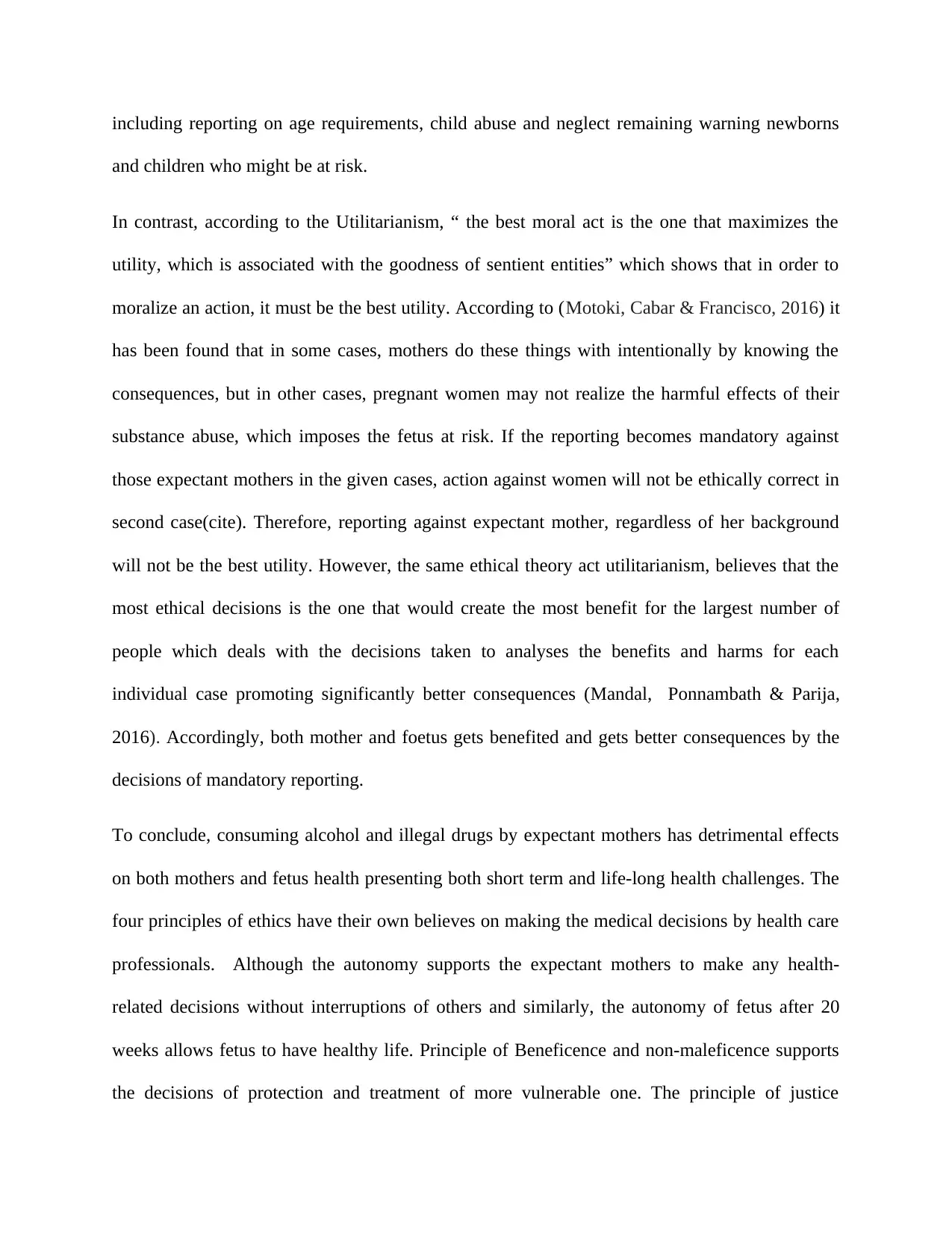
including reporting on age requirements, child abuse and neglect remaining warning newborns
and children who might be at risk.
In contrast, according to the Utilitarianism, “ the best moral act is the one that maximizes the
utility, which is associated with the goodness of sentient entities” which shows that in order to
moralize an action, it must be the best utility. According to (Motoki, Cabar & Francisco, 2016) it
has been found that in some cases, mothers do these things with intentionally by knowing the
consequences, but in other cases, pregnant women may not realize the harmful effects of their
substance abuse, which imposes the fetus at risk. If the reporting becomes mandatory against
those expectant mothers in the given cases, action against women will not be ethically correct in
second case(cite). Therefore, reporting against expectant mother, regardless of her background
will not be the best utility. However, the same ethical theory act utilitarianism, believes that the
most ethical decisions is the one that would create the most benefit for the largest number of
people which deals with the decisions taken to analyses the benefits and harms for each
individual case promoting significantly better consequences (Mandal, Ponnambath & Parija,
2016). Accordingly, both mother and foetus gets benefited and gets better consequences by the
decisions of mandatory reporting.
To conclude, consuming alcohol and illegal drugs by expectant mothers has detrimental effects
on both mothers and fetus health presenting both short term and life-long health challenges. The
four principles of ethics have their own believes on making the medical decisions by health care
professionals. Although the autonomy supports the expectant mothers to make any health-
related decisions without interruptions of others and similarly, the autonomy of fetus after 20
weeks allows fetus to have healthy life. Principle of Beneficence and non-maleficence supports
the decisions of protection and treatment of more vulnerable one. The principle of justice
and children who might be at risk.
In contrast, according to the Utilitarianism, “ the best moral act is the one that maximizes the
utility, which is associated with the goodness of sentient entities” which shows that in order to
moralize an action, it must be the best utility. According to (Motoki, Cabar & Francisco, 2016) it
has been found that in some cases, mothers do these things with intentionally by knowing the
consequences, but in other cases, pregnant women may not realize the harmful effects of their
substance abuse, which imposes the fetus at risk. If the reporting becomes mandatory against
those expectant mothers in the given cases, action against women will not be ethically correct in
second case(cite). Therefore, reporting against expectant mother, regardless of her background
will not be the best utility. However, the same ethical theory act utilitarianism, believes that the
most ethical decisions is the one that would create the most benefit for the largest number of
people which deals with the decisions taken to analyses the benefits and harms for each
individual case promoting significantly better consequences (Mandal, Ponnambath & Parija,
2016). Accordingly, both mother and foetus gets benefited and gets better consequences by the
decisions of mandatory reporting.
To conclude, consuming alcohol and illegal drugs by expectant mothers has detrimental effects
on both mothers and fetus health presenting both short term and life-long health challenges. The
four principles of ethics have their own believes on making the medical decisions by health care
professionals. Although the autonomy supports the expectant mothers to make any health-
related decisions without interruptions of others and similarly, the autonomy of fetus after 20
weeks allows fetus to have healthy life. Principle of Beneficence and non-maleficence supports
the decisions of protection and treatment of more vulnerable one. The principle of justice
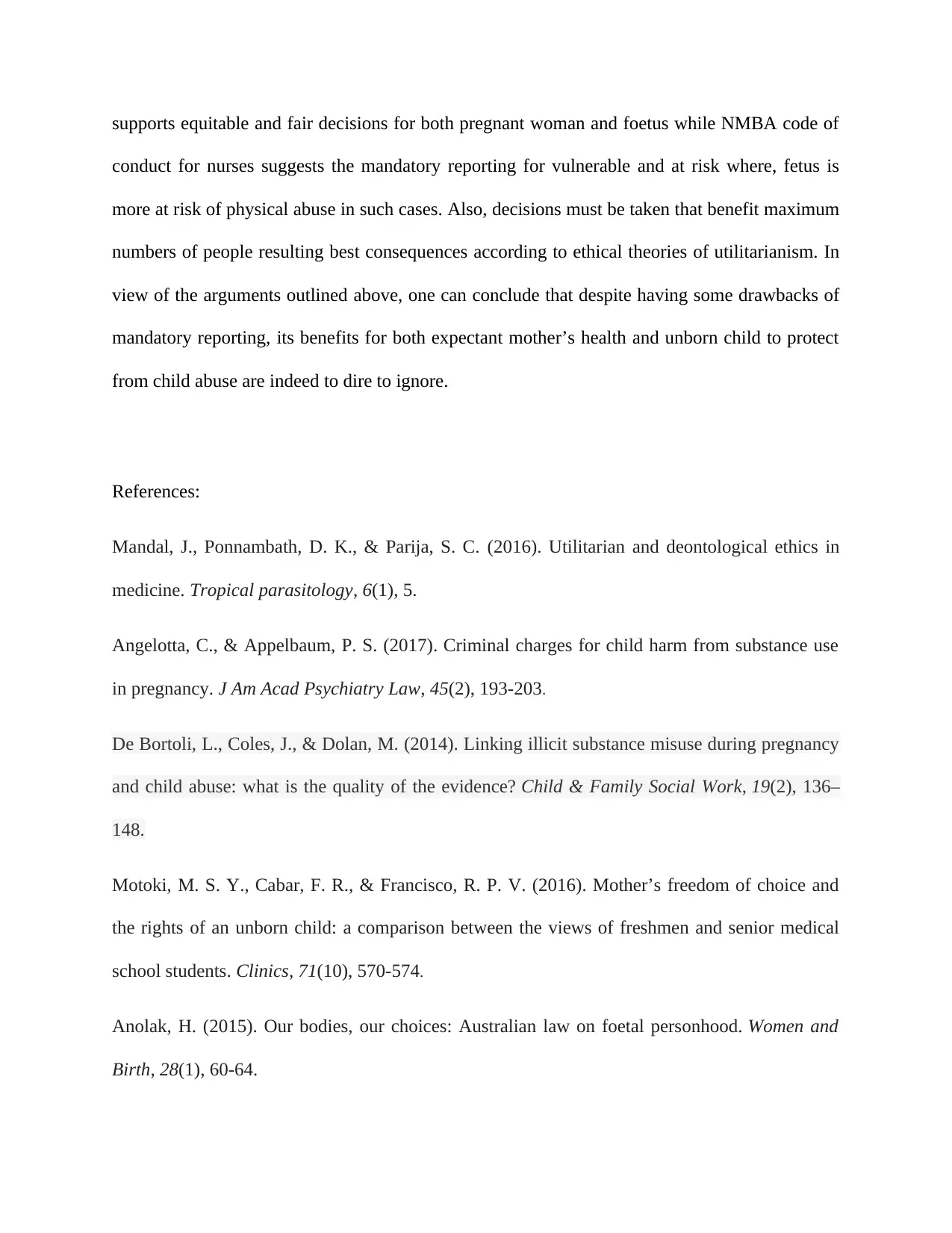
supports equitable and fair decisions for both pregnant woman and foetus while NMBA code of
conduct for nurses suggests the mandatory reporting for vulnerable and at risk where, fetus is
more at risk of physical abuse in such cases. Also, decisions must be taken that benefit maximum
numbers of people resulting best consequences according to ethical theories of utilitarianism. In
view of the arguments outlined above, one can conclude that despite having some drawbacks of
mandatory reporting, its benefits for both expectant mother’s health and unborn child to protect
from child abuse are indeed to dire to ignore.
References:
Mandal, J., Ponnambath, D. K., & Parija, S. C. (2016). Utilitarian and deontological ethics in
medicine. Tropical parasitology, 6(1), 5.
Angelotta, C., & Appelbaum, P. S. (2017). Criminal charges for child harm from substance use
in pregnancy. J Am Acad Psychiatry Law, 45(2), 193-203.
De Bortoli, L., Coles, J., & Dolan, M. (2014). Linking illicit substance misuse during pregnancy
and child abuse: what is the quality of the evidence? Child & Family Social Work, 19(2), 136–
148.
Motoki, M. S. Y., Cabar, F. R., & Francisco, R. P. V. (2016). Mother’s freedom of choice and
the rights of an unborn child: a comparison between the views of freshmen and senior medical
school students. Clinics, 71(10), 570-574.
Anolak, H. (2015). Our bodies, our choices: Australian law on foetal personhood. Women and
Birth, 28(1), 60-64.
conduct for nurses suggests the mandatory reporting for vulnerable and at risk where, fetus is
more at risk of physical abuse in such cases. Also, decisions must be taken that benefit maximum
numbers of people resulting best consequences according to ethical theories of utilitarianism. In
view of the arguments outlined above, one can conclude that despite having some drawbacks of
mandatory reporting, its benefits for both expectant mother’s health and unborn child to protect
from child abuse are indeed to dire to ignore.
References:
Mandal, J., Ponnambath, D. K., & Parija, S. C. (2016). Utilitarian and deontological ethics in
medicine. Tropical parasitology, 6(1), 5.
Angelotta, C., & Appelbaum, P. S. (2017). Criminal charges for child harm from substance use
in pregnancy. J Am Acad Psychiatry Law, 45(2), 193-203.
De Bortoli, L., Coles, J., & Dolan, M. (2014). Linking illicit substance misuse during pregnancy
and child abuse: what is the quality of the evidence? Child & Family Social Work, 19(2), 136–
148.
Motoki, M. S. Y., Cabar, F. R., & Francisco, R. P. V. (2016). Mother’s freedom of choice and
the rights of an unborn child: a comparison between the views of freshmen and senior medical
school students. Clinics, 71(10), 570-574.
Anolak, H. (2015). Our bodies, our choices: Australian law on foetal personhood. Women and
Birth, 28(1), 60-64.
⊘ This is a preview!⊘
Do you want full access?
Subscribe today to unlock all pages.

Trusted by 1+ million students worldwide
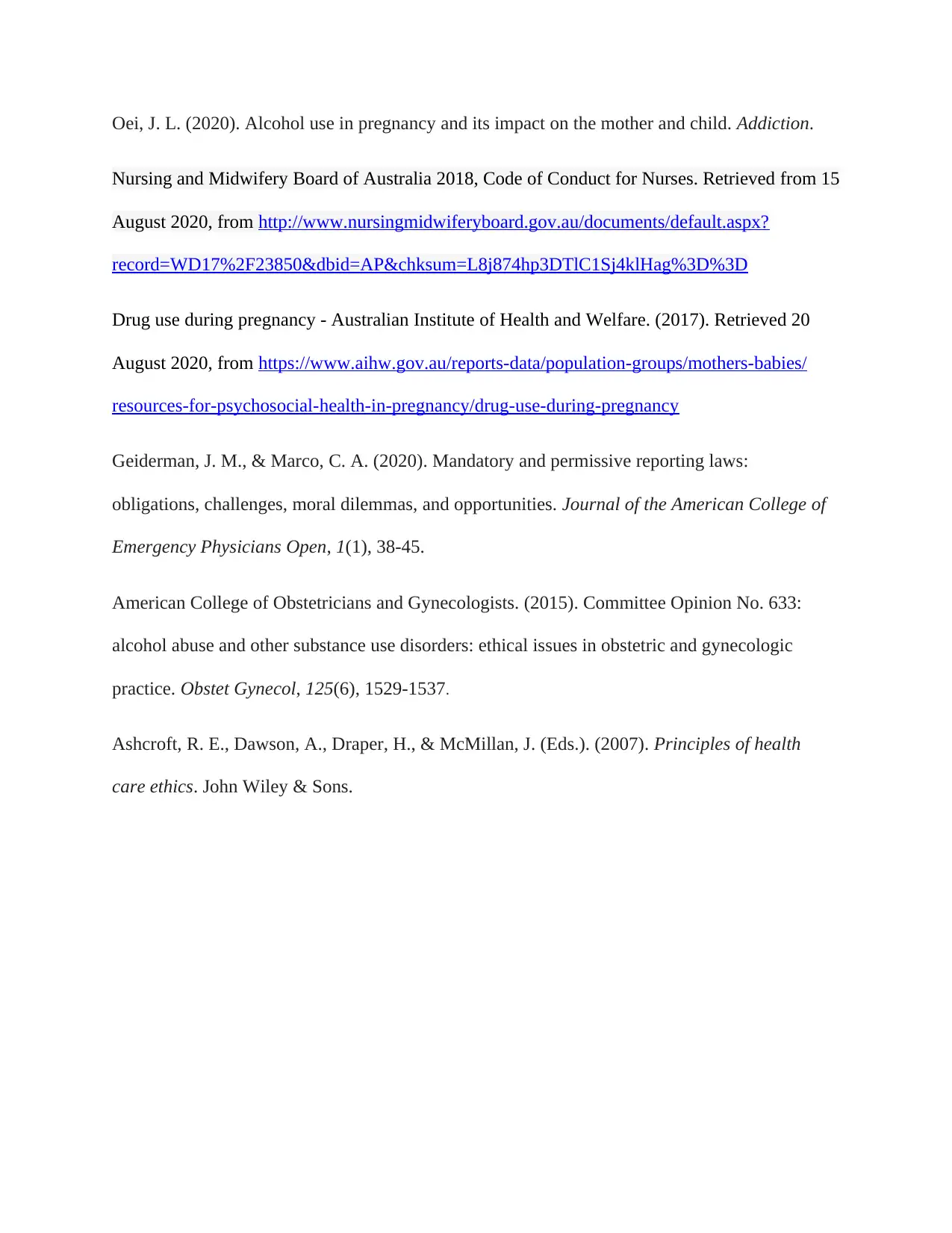
Oei, J. L. (2020). Alcohol use in pregnancy and its impact on the mother and child. Addiction.
Nursing and Midwifery Board of Australia 2018, Code of Conduct for Nurses. Retrieved from 15
August 2020, from http://www.nursingmidwiferyboard.gov.au/documents/default.aspx?
record=WD17%2F23850&dbid=AP&chksum=L8j874hp3DTlC1Sj4klHag%3D%3D
Drug use during pregnancy - Australian Institute of Health and Welfare. (2017). Retrieved 20
August 2020, from https://www.aihw.gov.au/reports-data/population-groups/mothers-babies/
resources-for-psychosocial-health-in-pregnancy/drug-use-during-pregnancy
Geiderman, J. M., & Marco, C. A. (2020). Mandatory and permissive reporting laws:
obligations, challenges, moral dilemmas, and opportunities. Journal of the American College of
Emergency Physicians Open, 1(1), 38-45.
American College of Obstetricians and Gynecologists. (2015). Committee Opinion No. 633:
alcohol abuse and other substance use disorders: ethical issues in obstetric and gynecologic
practice. Obstet Gynecol, 125(6), 1529-1537.
Ashcroft, R. E., Dawson, A., Draper, H., & McMillan, J. (Eds.). (2007). Principles of health
care ethics. John Wiley & Sons.
Nursing and Midwifery Board of Australia 2018, Code of Conduct for Nurses. Retrieved from 15
August 2020, from http://www.nursingmidwiferyboard.gov.au/documents/default.aspx?
record=WD17%2F23850&dbid=AP&chksum=L8j874hp3DTlC1Sj4klHag%3D%3D
Drug use during pregnancy - Australian Institute of Health and Welfare. (2017). Retrieved 20
August 2020, from https://www.aihw.gov.au/reports-data/population-groups/mothers-babies/
resources-for-psychosocial-health-in-pregnancy/drug-use-during-pregnancy
Geiderman, J. M., & Marco, C. A. (2020). Mandatory and permissive reporting laws:
obligations, challenges, moral dilemmas, and opportunities. Journal of the American College of
Emergency Physicians Open, 1(1), 38-45.
American College of Obstetricians and Gynecologists. (2015). Committee Opinion No. 633:
alcohol abuse and other substance use disorders: ethical issues in obstetric and gynecologic
practice. Obstet Gynecol, 125(6), 1529-1537.
Ashcroft, R. E., Dawson, A., Draper, H., & McMillan, J. (Eds.). (2007). Principles of health
care ethics. John Wiley & Sons.
Paraphrase This Document
Need a fresh take? Get an instant paraphrase of this document with our AI Paraphraser

1 out of 8
Related Documents
Your All-in-One AI-Powered Toolkit for Academic Success.
+13062052269
info@desklib.com
Available 24*7 on WhatsApp / Email
![[object Object]](/_next/static/media/star-bottom.7253800d.svg)
Unlock your academic potential
Copyright © 2020–2026 A2Z Services. All Rights Reserved. Developed and managed by ZUCOL.





